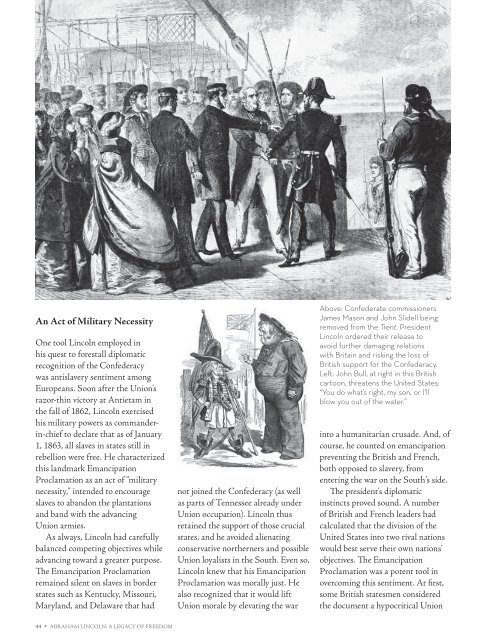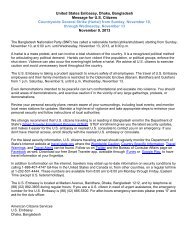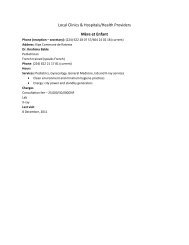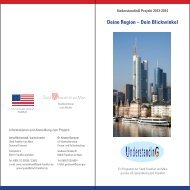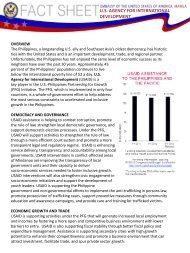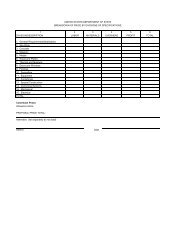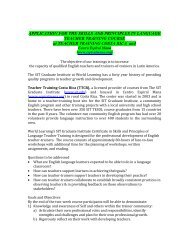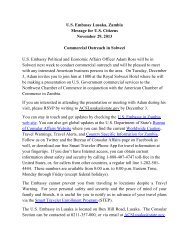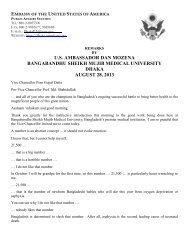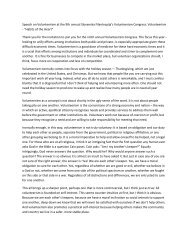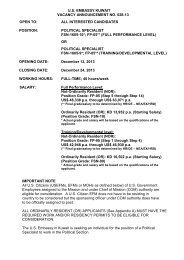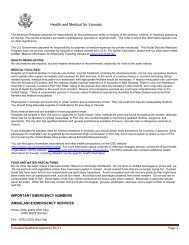Abraham Lincoln: A Legacy of Freedom - US Department of State
Abraham Lincoln: A Legacy of Freedom - US Department of State
Abraham Lincoln: A Legacy of Freedom - US Department of State
Create successful ePaper yourself
Turn your PDF publications into a flip-book with our unique Google optimized e-Paper software.
An Act <strong>of</strong> Military Necessity<br />
One tool <strong>Lincoln</strong> employed in<br />
his quest to forestall diplomatic<br />
recognition <strong>of</strong> the Confederacy<br />
was antislavery sentiment among<br />
Europeans. Soon after the Union’s<br />
razor-thin victory at Antietam in<br />
the fall <strong>of</strong> 1862, <strong>Lincoln</strong> exercised<br />
his military powers as commanderin-chief<br />
to declare that as <strong>of</strong> January<br />
1, 1863, all slaves in states still in<br />
rebellion were free. He characterized<br />
this landmark Emancipation<br />
Proclamation as an act <strong>of</strong> “military<br />
necessity,” intended to encourage<br />
slaves to abandon the plantations<br />
and band with the advancing<br />
Union armies.<br />
As always, <strong>Lincoln</strong> had carefully<br />
balanced competing objectives while<br />
advancing toward a greater purpose.<br />
The Emancipation Proclamation<br />
remained silent on slaves in border<br />
states such as Kentucky, Missouri,<br />
Maryland, and Delaware that had<br />
not joined the Confederacy (as well<br />
as parts <strong>of</strong> Tennessee already under<br />
Union occupation). <strong>Lincoln</strong> thus<br />
retained the support <strong>of</strong> those crucial<br />
states, and he avoided alienating<br />
conservative northerners and possible<br />
Union loyalists in the South. Even so,<br />
<strong>Lincoln</strong> knew that his Emancipation<br />
Proclamation was morally just. He<br />
also recognized that it would lift<br />
Union morale by elevating the war<br />
<br />
<br />
<br />
<br />
<br />
<br />
<br />
<br />
<br />
<br />
<br />
into a humanitarian crusade. And, <strong>of</strong><br />
course, he counted on emancipation<br />
preventing the British and French,<br />
both opposed to slavery, from<br />
entering the war on the South’s side.<br />
The president’s diplomatic<br />
instincts proved sound. A number<br />
<strong>of</strong> British and French leaders had<br />
calculated that the division <strong>of</strong> the<br />
United <strong>State</strong>s into two rival nations<br />
would best serve their own nations’<br />
objectives. The Emancipation<br />
Proclamation was a potent tool in<br />
overcoming this sentiment. At first,<br />
some British statesmen considered<br />
the document a hypocritical Union<br />
44 ABRAHAM LINCOLN: A LEGACY OF FREEDOM


